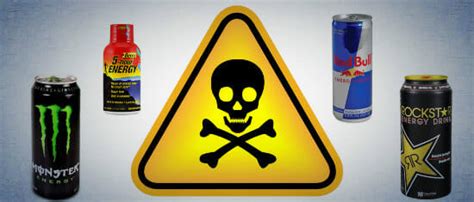The energy drink industry has experienced unprecedented growth over the past two decades, with sales projected to reach $69.95 billion by 2027, growing at a Compound Annual Growth Rate (CAGR) of 7.2% from 2020 to 2027. Despite their popularity, energy drinks have been linked to several health concerns, prompting regulatory bodies and health organizations to issue warnings about their consumption. As a registered dietitian with a specialization in nutrition and public health, I will delve into the potential dangers associated with energy drink consumption, providing an evidence-based analysis of the risks and consequences.
Key Points
- Energy drinks can lead to cardiovascular problems, including heart palpitations, high blood pressure, and cardiac arrhythmias.
- Caffeine overdose is a significant risk, with symptoms ranging from mild to severe, including seizures, coma, and even death.
- Energy drinks can cause type 2 diabetes and metabolic syndrome due to their high sugar content.
- Consuming energy drinks can lead to dental erosion and tooth decay due to their acidity and sugar content.
- Energy drinks can have negative effects on mental health, including increased anxiety, depression, and stress levels.
Cardiovascular Risks

Energy drinks often contain high levels of caffeine, taurine, and other stimulants that can increase heart rate and blood pressure, leading to cardiovascular problems. A study published in the Journal of the American Heart Association found that energy drink consumption was associated with an increased risk of cardiac arrhythmias, heart palpitations, and high blood pressure. The American Heart Association recommends that adults limit their daily caffeine intake to no more than 400 milligrams, approximately the amount found in three to four cups of brewed coffee. However, some energy drinks can contain as much as 300 milligrams of caffeine per serving, exceeding the recommended daily limit.
Caffeine Overdose
Caffeine overdose is a significant concern, particularly among young people who may consume energy drinks in large quantities or combine them with other stimulants. According to the National Institute on Drug Abuse, caffeine overdose can cause symptoms ranging from mild to severe, including seizures, coma, and even death. In 2018, the FDA reported 34 deaths associated with energy drink consumption, highlighting the need for stricter regulations and greater awareness about the potential risks.
| Energy Drink | Caffeine Content (mg) |
|---|---|
| Red Bull (8.4 oz) | 80 |
| Monster Energy (16 oz) | 344 |
| Rockstar Energy (16 oz) | 320 |
| 5-Hour Energy (2 oz) | 242 |

Type 2 Diabetes and Metabolic Syndrome

Energy drinks often contain high amounts of sugar, which can lead to an increased risk of type 2 diabetes and metabolic syndrome. A study published in the Journal of Nutrition found that consuming energy drinks regularly was associated with a higher risk of developing type 2 diabetes, insulin resistance, and metabolic syndrome. The American Diabetes Association recommends that adults limit their daily sugar intake to no more than 25 grams (6 teaspoons) for women and 36 grams (9 teaspoons) for men. However, some energy drinks can contain as much as 54 grams of sugar per serving, exceeding the recommended daily limit.
Dental Erosion and Tooth Decay
Energy drinks can also cause dental erosion and tooth decay due to their acidity and sugar content. A study published in the Journal of Dental Research found that energy drinks were more erosive to tooth enamel than other acidic beverages, such as soda and sports drinks. The American Dental Association recommends that individuals limit their consumption of acidic beverages and practice good oral hygiene to prevent dental erosion and tooth decay.
Mental Health Concerns
Energy drinks can have negative effects on mental health, including increased anxiety, depression, and stress levels. A study published in the Journal of Clinical Psychology found that energy drink consumption was associated with higher levels of anxiety, depression, and stress in young adults. The National Institute of Mental Health recommends that individuals prioritize stress management techniques, such as exercise, meditation, and social support, to mitigate the negative effects of energy drink consumption on mental health.
What are the recommended daily limits for caffeine intake?
+The American Heart Association recommends that adults limit their daily caffeine intake to no more than 400 milligrams, approximately the amount found in three to four cups of brewed coffee.
Can energy drinks cause cardiovascular problems?
+Yes, energy drinks can cause cardiovascular problems, including heart palpitations, high blood pressure, and cardiac arrhythmias, due to their high levels of caffeine, taurine, and other stimulants.
How can I reduce my risk of energy drink-related health problems?
+To reduce your risk of energy drink-related health problems, it is essential to be aware of the potential risks, monitor your caffeine intake, and consult with a healthcare professional before consuming energy drinks, especially if you have pre-existing medical conditions.
In conclusion, energy drinks can pose significant health risks, including cardiovascular problems, caffeine overdose, type 2 diabetes, metabolic syndrome, dental erosion, tooth decay, and mental health concerns. As a registered dietitian, I recommend that individuals prioritize their health and well-being by being aware of the potential risks associated with energy drink consumption and taking steps to mitigate them. By making informed choices and consulting with healthcare professionals, individuals can reduce their risk of energy drink-related health problems and maintain a healthy lifestyle.



